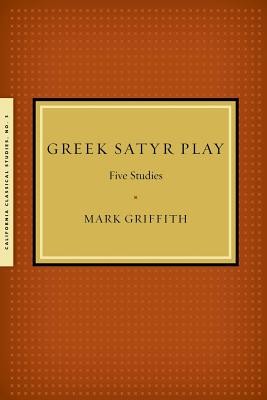
- We will send in 10–14 business days.
- Author: Mark Griffith
- Publisher: California Classical Studies
- Year: 2015
- Pages: 224
- ISBN-10: 1939926041
- ISBN-13: 9781939926043
- Format: 15.2 x 22.9 x 1.3 cm, softcover
- Language: English
- SAVE -10% with code: EXTRA
Reviews
Description
With a new introduction and some revisions, these reprinted essays on Classical Greek satyr plays suggest new critical approaches to this important dramatic genre. Griffith argues that satyr plays presented audiences with sophisticated, multilayered narratives of romance, escapist adventure, and musical-choreographic exuberance, amounting to a "parallel universe" to that of the accompanying tragedies in the City Dionysia festival. The class and status distinctions between heroic/divine characters and the rest (choruses, messengers, servants, etc.) that are so integral to Athenian tragedy are shown to be present also, in exaggerated form, in satyr drama, with the satyr chorus occupying a role that also inevitably recalled for the Athenian audiences their own (often foreign-born) slaves. The satyr plays' stylistic fusion of adventure and romance, elegant sophistication and rustic naïveté, anticipates in many respects the later developments of Greek pastoral and prose romance.
EXTRA 10 % discount with code: EXTRA
The promotion ends in 20d.10:26:39
The discount code is valid when purchasing from 10 €. Discounts do not stack.
- Author: Mark Griffith
- Publisher: California Classical Studies
- Year: 2015
- Pages: 224
- ISBN-10: 1939926041
- ISBN-13: 9781939926043
- Format: 15.2 x 22.9 x 1.3 cm, softcover
- Language: English English
With a new introduction and some revisions, these reprinted essays on Classical Greek satyr plays suggest new critical approaches to this important dramatic genre. Griffith argues that satyr plays presented audiences with sophisticated, multilayered narratives of romance, escapist adventure, and musical-choreographic exuberance, amounting to a "parallel universe" to that of the accompanying tragedies in the City Dionysia festival. The class and status distinctions between heroic/divine characters and the rest (choruses, messengers, servants, etc.) that are so integral to Athenian tragedy are shown to be present also, in exaggerated form, in satyr drama, with the satyr chorus occupying a role that also inevitably recalled for the Athenian audiences their own (often foreign-born) slaves. The satyr plays' stylistic fusion of adventure and romance, elegant sophistication and rustic naïveté, anticipates in many respects the later developments of Greek pastoral and prose romance.


Reviews